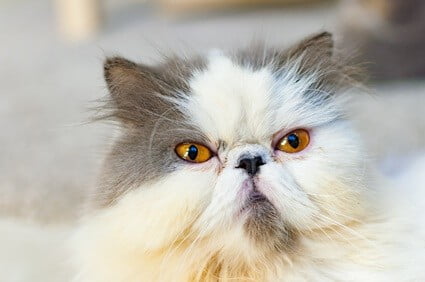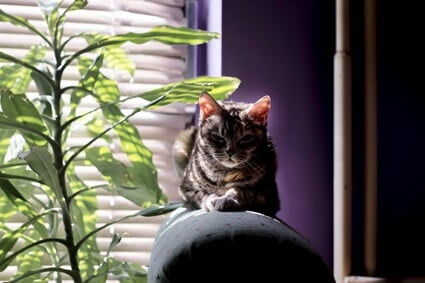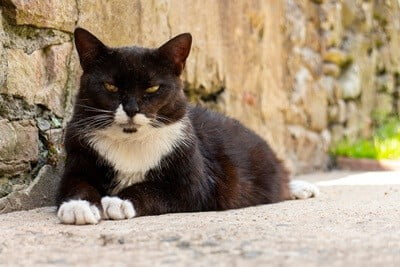Most cats are feisty when they’re younger but mellow out with age. If you find your older cat growing more grumpy in its twilight years, this may seem odd. In truth, older cats shouldn’t get more cantankerous with age.
If your older cat is suddenly cranky, moody, or bad-tempered, it may have a health condition, such as arthritis, cognitive dysfunction, dental disease, or hyperthyroidism. Your cat may not be satisfied with its care or become frustrated that it finds it harder to play, run, jump, and hunt.
Of course, your cat may not have any underlying health conditions and still act grumpy. This could be due to its personality or dissatisfaction with growing older. We’re going to explore how feline personalities change as they age, why they might be acting meaner, and how a healthy older cat should be acting.
Do Cats’ Personalities Change as They Get Older?
Often, cats mellow out as they age. They are known to be rather curious and playful when they’re younger. They might climb up on any surface they can, scratch away at your furniture, and even knock fragile things off of counters just for fun. Of course, as your cat gets older, you might notice it growing less active and sleeping more often.
This does not mean your cat will be drastically different from when it was younger. It may be just as playful as it was when it was a kitten, but you also need to take your cat’s old age into consideration.
For example, your cat may become frustrated that it cannot move as agilely as it once did. As such, moving its toys, food bowls, and other items to more accessible places is a good start.
If it starts to become meaner or grumpy out of nowhere, it can be a sign that something is wrong. It’s not a natural product of old age but a cry for help.
Do Cats Get Meaner as They Get Older?
If your cat seems to be meaner than when it was younger, it’s possibly frustrated with its current living conditions. Getting older isn’t easy, and it can be even harder if you don’t take steps to ensure your elderly cat stays healthy.
Elderly cats will have a harder time cleaning themselves. As such, you may want to check your cat’s fur for any matted areas or inflammation. Brushing its fur twice a day can help your cat remain clean.
You may also find urine or fecal matter stuck to its fur. Gently wipe this matter off with unscented wipes to ensure no infections occur.
Of course, if your cat doesn’t appear to like you or your presence all of a sudden, this can be another matter entirely. You may need to re-evaluate its current lifestyle and see what you can change.
According to Behavioural Processes, a study of 416 cats found that personality traits such as playfulness or amiability were positively correlated with a cat’s satisfaction with its attachment with its owner.
Now correlation is not causation, but it can be assumed that some other discomfort is causing your cat’s overall dissatisfaction. Determining what that discomfort is can be a bit tricky, especially because cats tend to hide any discomfort or pains they might have.
Do Cats Get More Aggressive as They Get Older?
Older cats will manifest signs of their age. This shouldn’t include anger or meanness, but it can, depending on the situation. In reality, it’s more likely that your suddenly-mean cat is suffering from a serious health condition.
This can include any of the following:
- Arthritis
- Hyperthyroidism
- Feline cognitive dysfunction
- Dental disease
- Obesity/other sudden weight changes
- Vision loss
The Veterinary Nursing Journal states that many senior cats display behavioral changes much earlier than any physical symptoms of their illnesses or conditions.
Cats tend to hide their injuries or illnesses, even from those they’re close to. In the wild, looking vulnerable means that larger predators can eat or attack the cat. As such, cats become more aggressive to compensate for that.
Arthritis
Arthritis is a common health issue among cats, no matter their current age. According to the Cat Care Clinic, arthritis in cats is often underdiagnosed since it’s not properly recognized in younger cats.
The study found that kittens as young as six months displayed symptoms of arthritis, which only worsened with age. As such, your cat may have arthritis or some other degenerative bone disease. This can lead to behavioral issues.
Symptoms of arthritis in cats include:
- Decreased appetite and weight loss
- Increase in either restlessness or sleeping
- Matted fur from inability to reach around and lick its entire body
- Constant urination, defecation, or constipation
- Hunched back with neck stretched out
- Stiff gait/difficulty jumping or moving in general
- Increased, sudden aggression when handled
Indeed, the pain that arthritis causes may be why your cat is suddenly grumpier. Unfortunately, many owners, even those with older cats, fail to recognize these symptoms and attribute them to old age alone. This can be detrimental to your cat’s health, especially if you do not help it manage its symptoms.
According to Cornell University, catching any symptoms early on can help you, and your vet come up with a more comprehensive plan to help your cat. You can manage these symptoms as well as improve the cat’s quality of life.

Hyperthyroidism
Hyperthyroidism occurs when your cat’s thyroid hormones suddenly kick into overdrive. This can cause the thyroid gland in your cat’s neck to swell and make it harder to eat and drink. You might notice your cat starting to lose weight or drinking a lot more water more often. Your cat may also vomit or suffer from diarrhea.
Because these symptoms can overlap with other conditions, your veterinarian will have to perform a blood test and check its neck for an enlarged thyroid gland. Once the expert properly diagnoses your cat, it’s possible to recommend medication, surgery, or specific therapies to combat the growth.
Dental Disease
You might notice that your elderly cat’s breath smells bad at times. This could be a sign that your cat has a dental disease. If left untreated, it is possible that your cat’s teeth will fall out and that the pain will cause it to lash out at you.
Dental disease is one of the most common afflictions domestic cats tend to suffer from. You can easily avoid this by maintaining a strict routine of brushing your cat’s teeth at least once a day, every day. You should also monitor its diet (including the animals it might hunt).
Obesity and Weight Changes
As your cat ages, you might notice its weight starting to fluctuate. According to the University of Edinburgh, your cat may start to either lose or gain weight at a rapid pace.
Weight loss is often attributed to a cat’s slowly dwindling sense of smell and taste, making it less interested in foods it may have once enjoyed. Pain from dental disease may also contribute to this avoidance of food.
Of course, there are factors that can lead to weight gain. An elderly cat will not want to move around as much, contributing to it suddenly packing on the pounds. Your cat’s metabolism will also start to slow down as it ages.
You should always have a rough idea (at least) of how much your cat weighs so that you can catch these sudden drops or gains. If any sudden loss or gain is recorded, then you may need to take your cat to see its veterinarian.
This will determine if there may be some underlying cause behind it all (such as hyperthyroidism). Your vet can also help you develop a better diet plan that takes its age and any current health conditions into account.
Of course, even elderly cats can be averse to sudden changes. You need to implement any new diet changes gradually so that it does not stop eating altogether. Changing its diet can also allow your cat to live a fuller, healthier life even in its old age.
Vision or Hearing Loss and Feline Cognitive Dysfunction
As your cat ages, it’s possible that its vision and hearing will not be as it once was. You might even notice its eyes starting to cloud over.
Many owners believe this to be a sign of cataracts, but this is not always the case. Instead, this condition may be lenticular sclerosis. This is a filmy or murky discoloration that is quite normal for middle-aged and senior cats.
It will not impact its vision in any major way, though you should still watch out for any other signs of your cat’s vision deteriorating. Hearing loss can also occur for a variety of reasons. Often, the loss of these senses can make your cat much more aggressive towards you and your family. It may think you are a stranger.
It will not help if your cat has started to become senile as well. Senility in elderly cats is often a result of feline cognitive dysfunction, which is essentially like dementia in animals. Symptoms of feline cognitive dysfunction include:
- Wandering around/disorientation
- Increased vocalization
- Rubbing its head against walls or other hard surfaces
- Unstable circadian rhythm
- Increased irritability/aggression
- Withdrawn behavior/lack of recognition of its owner
Unfortunately, there is little an owner can do when your cat displays such symptoms. This is why you should do your best to delay these symptoms.
Keeping your cat’s mind sharp can be as simple as feeding it foods rich in Vitamin E and antioxidants and talking to it daily. You want to engage its brain as often as you can to maintain its mental faculties for as long as possible.
Relieving your cat’s stress by giving it easier access to its litter box, food, and other items will also help. You may even build ramps around your home to alleviate the pain in its joints and make it easier for it to climb to certain places.

How Do Cats Act When They Get Older?
Even healthy elderly cats will begin to show their age in time. Older cats will be a lot less active than their younger counterparts. You will find elderly cats lying about more often.
Lethargy can be a symptom of an underlying disease, but more often than not, elderly cats lack the energy they once had as kittens.
You should pay much closer attention to your cat’s health and diet when it reaches 8-10 years old. Not all cat behavior will change with age. Your cat’s temperament will stay much the same, though it can easily grow more aggressive towards you if you do not tend to its illnesses or other issues in time.
Let’s look at how cats should act at each stage in its life below:
Kitten (0 to 6 months old)
Kittens are extremely active and will actively explore new territories they feel safe in. It is at this stage in life that you will need to provide the most training, including potty training and socialization skills.
Juvenile (6 months to 2 years old)
At this age, a cat will reach its full size and sexual maturity. As a result, your juvenile cat may be quite active and prone to wandering in search of a mate. This is also the ideal time to spay or neuter your cat.
Adult (2 years old to 8 years old)
Adult cats will have established personalities and will not need as much supervision or training. They are considered mature at around the age of 7-8 years old. This means they will begin to slow down and display symptoms of serious health conditions.
Elderly (8 to 10 years old)
Elderly cats will display more aggression due to their various aches and pains. Not all elderly cats will suffer from health conditions, but it is good to keep in mind that your cat’s sudden aggression may not be personal.
Indeed, the Journal of Feline Medicine and Surgery states that aggression in cats is a variant of normal feline behavior. If your cat is acting more aggressively, then there is always some reasonable cause for it.
Geriatric (10 years old and up)
Geriatric cats are the oldest stage of a cat’s lifespan, and they may display all sorts of health complications and issues. Emphasis on your cat’s overall comfort is always advised at this stage in its life. It shouldn’t grow highly aggressive unless it’s sick, but it may have a shorter temper due to its aging.

